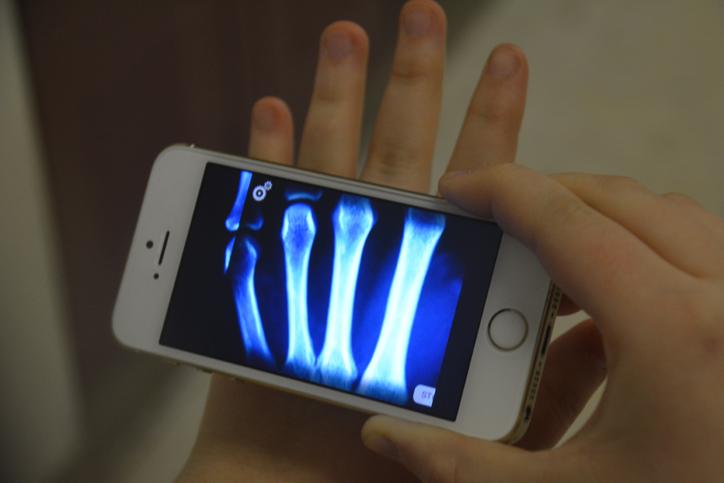Internet self-diagnosis is inadequate
The dangers of using the Internet for self-diagnosis can cause many issues that can be solved simply by visiting a doctor.
March 9, 2015
Back when the restaurant I work at opened, I was standing around with a few co-workers just chatting. It was all girls, and we were gossiping and such, the stuff that girls usually do when they are together. A co-worker of mine, Zoe Wissler who is a senior at Hoover High School this year, was telling us about her experience in Iowa City. Zoe has anorexia. Her journey has not been easy whatsoever. While Zoe was telling about Iowa City, another co-worker of mine decided to comment. She who will not be named said, and I quote, “One time, I was really mad at my dad so I had anorexia for like three days.”
I do not think I can explain the amount of shock and utter disgust my co-workers and I were in. Here is this girl, who has gone through more than any of us could imagine, and she just had to witness someone self-diagnosing themselves with her illness. Now, if I were her, I probably would have had a huge freak out but Zoe was able to remain calm.
Self-diagnosing is not okay, yet people do it everyday. It is so easy to diagnose yourself with something like depression or an eating disorder, just because that is what you think you are truly going through. I hear or see it at least every day. The common tweet or someone just simply saying, “Oh, my boyfriend broke up with me, I’m so depressed.” The tweet usually is somewhere along the lines of that, but does that not sound ridiculous?
Imagine what a person who actually has depression is thinking about when they come across someone making that drastic diagnosis. This statement is offensive. Bad breakups, friendships ending, not getting what you want, etc., are not leading you to depression. Depression is more than just being upset over one thing. It is a complex illness and people throw the word around like it is nothing. Depression is a real illness that impacts the brain. Anyone suffering from depression will tell you, it’s not imaginary or “all in your head.” Depression is more than just feeling “down.” It is a serious mental disease.
Think about when someone says, “That’s so retarded.” Retarded is one word that comes off as offensive to a lot of people for multiple reasons. Self-diagnosing yourself with something like depression or an eating disorder can come off offensive just like using this very offensive word to mentally handicapped people.
Anorexia nervosa, often simply called anorexia, is an eating disorder characterized by an abnormally low body weight, intense fear of gaining weight and a distorted perception of body weight. People with anorexia place a high value on controlling their weight and shape, using extreme efforts that tend to significantly interfere with activities in their lives. Anorexia can be diagnosed in several ways. These include: physical exams, lab tests and psychological evaluations. Testing may also be done to determine how much energy your body uses, which can help in planning nutritional requirements.
To be diagnosed with anorexia nervosa, a person generally must meet criteria in the Diagnostic and Statistical Manual of Mental Disorders (DSM-5), published by the American Psychiatric Association. DSM-5 diagnostic criteria for anorexia include: Restricting food intake, which is eating less than needed to maintain a body weight that’s at or above the minimum normal weight for your age and height. Fear of gaining weight, which is the intense fear of gaining weight or becoming fat, or persistent behavior that interferes with weight gain, such as vomiting or using laxatives, even though the person is underweight. Problems with body image, which is denying the seriousness of having a low body weight, connecting your weight to self-worth, or having a distorted image of appearance or shape.
With not seeing a professional and self-diagnosing, it can become dangerous. People who self-diagnose tend to go to the Internet to research symptoms and walk away thinking they have a more serious condition than they actually do.
Say that someone assumes they have depression and treat it with an over-the-counter prescription, that person may completely miss a medical syndrome. By self-diagnosing, you may be missing something that you cannot see. We do know and see ourselves, but sometimes, we need a mirror to see ourselves more clearly. The doctor is that mirror.
People use sites like WebMD and Mayo Clinic because of their high credibility. These sites, however, lose credibility when people go to them to self-diagnose themselves with an illness. Although these sites are actually credible, they are not meant to be used to look up symptoms for a diagnosis.
Psychologist Ronelle Langley has been practicing psychology for 15+ years. She explains believes many dangers come along with self-diagnosing from the Internet. “I think people think they know because they can look up any topic on the internet,” Langley said. “Many sources may not be reliable and can make matters worse.”
Langley uses the brain and heart as an example of the dangers of self-diagnosing. “Let’s say the brain and the heart are the two most important organs in our body,” Langley said. “Would you self-diagnose if you suspect your heart needs to be diagnosed because of some warning signs? So why would people self-diagnose when it has to do with a similar important part of our body, the brain where our mind is centered?”
The wrong diagnosis could lead to long-lasting problems. Quit looking to the internet to figure out your illness and go see a professional.








Gangrene • Mar 11, 2015 at 1:47 pm
Saying that you are depressed at one time isn’t self-diagnosing, nor do I think that is offensive. They aren’t saying they have depression, they are saying the are sad and upset. I don’t think it makes depression seem irrelevant, because depression is quite literally THE MOST talked about and recognized mental disorder. Yes, girls who say they are depressed over a break-up are silly, but they are not self-diagnosing. If you wanted to talk about issues will self-diagnosis, you could’ve talked about people diagnosing themselves with concerning mental disorders such as bipolar or dissociative identity disorder.
Also, what kind of over-the-counter drug treats depression???